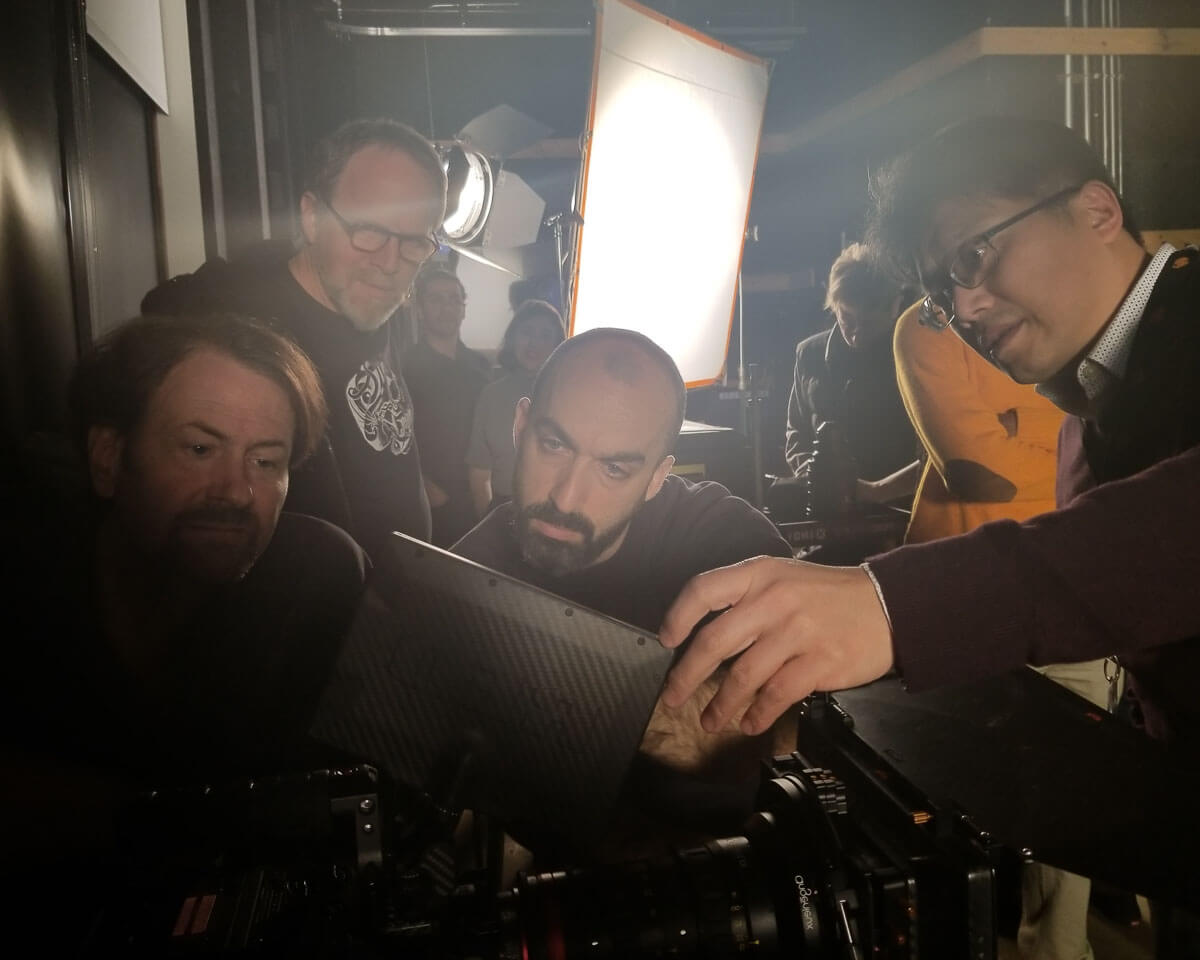Cinema Arts, M.F.A.
School of Visual, Media and Performing Arts
Program Overview
Storytelling with moving images, be it in the cinema or on your phone, is the dominant form of communication of the modern era. We train storytellers to be total creatives, understanding the storytelling and collaborative skills that are required to make great motion pictures. On top of that we foster in every student the “second skill” that is designed to be a pathway into our complex industry. Students in our program spend most of their time hands on filmmaking, directing projects from their first semester, and also supporting their peers as cinematographers, producers, editors, production designers and more to a comprehensive skillset to launch a fifty year career.

Program Details
The program information listed here reflects the approved curriculum for the 2024–25 academic year per the Brooklyn College Bulletin. Bulletins from past academic years can be found here.
Program Requirements (66 Credits)
Sixty-six credits are required for the specializations in live action filmmaking or digital animation and visual effects (DAVE).
This degree can be pursued on a full- or part-time basis, but part-time must be enrolled in a prescribed order.
Matriculation Requirements
Applicants who have completed a bachelor’s degree with a minimum GPA of 3.00 satisfy the undergraduate requirements of this program.
Student Learning Outcomes
- Create a body of work that reflects an understanding and command of the short-form narrative and the principles of visual storytelling.
- Ability to successfully collaborate with fellow students, cast, and crew in pursuit of common creative and production objectives.
- Ability to manage the film production process, including the resources of time, money, technology, and people.
- Exhibit an ability to learn from the study of film history, film theory, and master artists and technicians in the field.
Admissions Requirements
- Fall Application Deadline—January 15, then rolling admission.
- Spring Application Deadline—This program does not accept applications for spring.
Supporting Documents for Matriculation
Submit the following documents to the Office of Graduate Admissions:
- Transcripts from all colleges and universities attended. Applicants who earned a bachelor’s degree outside the United States need to submit a course-by-course international transcript evaluation. See Graduate Admissions for more information.
- Résumé.
- Statement of purpose. Write a three- to four-page (double-spaced, 12-point font) statement explaining your purpose in undertaking graduate study in cinema arts. This is your opportunity to articulate your goals, interests, and career plans as they relate to pursuing an M.F.A. in cinema arts. We are trying to gain a sense of who you are and the distinctive experiences and interests that have motivated you to pursue this degree.
- Two letters of recommendation from former instructors, employers, collaborators, or other people familiar with you and your work.
- Creative portfolio. Prepare and submit a portfolio of creative work via the online application system, Slideroom. Note that, upon submitting your creative portfolio, Slideroom will charge a small fee for applicants to use this service. (You may pay this fee with a credit or debit card.) Portfolio submission materials will not be returned to applicants. We recommend submitting copies only. All cinema arts applicants must submit one of the following:
- A short film that you have personally directed, or for which you were a principal creative contributor and credited as such (e.g., as writer, producer, cinematographer, editor, vfx designer/supervisor), not to exceed 15 minutes; or
- An original treatment for a feature film, in 10 pages or less (double-spaced, 12-point font), which can include photographs or visuals not to exceed one third of total treatment, plus one additional written page explaining why you want to make this project and create this specific story; or
- A short script (correctly formatted) that you have individually written, not to exceed 12 pages in length.
Additional/optional items: You are welcome to submit up to five additional items on Slideroom (either visual pieces, such as videos, photos, visual documentation of creative work, or written pieces, provided you played a key role on those works). Clearly describe exactly your role on each item that you submit on Slideroom.
While you are required to submit a portfolio of your creative work on Slideroom, you are permitted to supplement your portfolio by listing a URL to an online portfolio of your creative work on your résumé or CV.
Required Tests
- F-1 or J-1 international students must submit English Proficiency Exam. TOEFL- 79, IELTS- 6.5, PTE- 58-63, Duolingo 105-160.
Refer to the instructions at Graduate Admissions.
Contact
Feirstein Graduate School of Cinema
25 Washington Avenue
Brooklyn, NY 11210
E: Feirstein@brooklyn.cuny.edu
P: 718.237.3410
Or contact:
Office of Graduate Admissions
222 West Quad Center
2900 Bedford Avenue, Brooklyn, NY 11210
E: grads@brooklyn.cuny.edu
P: 718.951.4536
Office Hours
Mondays–Fridays, 9 a.m.–5 p.m.
To make an appointment with a graduate admissions counselor, visit:
Specializations
Live Action Filmmaking
All of the following courses:
FGSC 7801G, 7271G, 7301G, 7121G, 7821G, 7272G, 7312G 7016G, 7831G, 7202G, 7101G, 7832G, 7322G, and one of the following: 7274G, 7275G, 7277G or 7278G.
In the third year, students complete their thesis in one of several disciplines:
- To complete a thesis as director, students are required to take the following: 7964G, 7951G or Masters Supervision, 7961G or Masters Supervision and five elective courses.
- To complete a thesis as a cinematographer, students are required to take the following: 7277G, 7964G, and 7953G or Masters Supervision and six elective courses.
- To complete a thesis as a screenwriter, students are required to take the following: 7952G, 7962G and six elective courses.
- To complete a thesis as an editor, students are required to take the following: 7278G, 7964G, 7953G or Masters Supervision and six elective courses.
- To complete a thesis as a producer, students are required to take the following: 7274G, 7964G, 7953G or Masters Supervision and six elective courses.
- To complete a thesis as a VFX artist, students are required to take the following: 7601G, 7611G, 7953G or Masters Supervision and any three VFX core courses or electives from the list of electives specified under “Digital Animation and Visual Effects” along with two additional electives
- One of all students’ elective courses must be a screen studies course.
Examples of Live Action Filmmaking Discipline Electives:
- 35mm Cinematography
- Adaptation
- Film Finance
- Entertainment Law
- Writers Room Workshop
- Stage Lighting
- Color Grading
- Avid Editing
- Assistant Editors Workshop
- Branded Content
- Directing the Commercial
- Directing the Music Video
- Writing for New Media & Games
- Process of Producing & the Business of Film
- Social Justice Filmmaking
- Global Screen Cultures
- Genre Cinema
- Filmmakers Symposium
Digital Animation and Visual Effects
All of the following courses: FGSC 7523G, 7014G, 7601G, 7611G, 7612G, 7613G, 7614G, 7621G, 7622G, 7624G, 7634G, 7635G, 7957G, 7943G, 7955G, 7965G, 7966G, and five elective courses.
Examples of Digital Animation and Visual Effects Advanced Discipline Electives
- 3D Character Animation 1
- 3D Character Animation 2
- Typography, Design, and Motion Graphics
- Motion Capture
- Editing
- Screenwriting
- Directing Actors
- Sound Editing and Design
- Lighting Workshop
- 3D Computer Animation 4
- Hybrid Animation
- Experimental Animation
- Theories of Animation & VFX
The Support You’ll Find
New York City is one of the richest filmmaking centers on earth, and our faculty pulls from that community to present a diversity of experiences and voices in the classroom. Feirstein also offers the opportunity to work with high-profile thesis mentors and benefits from the support of an advisory council made up of top Hollywood talent.

Internships and Employers
Through job fairs, the internship database, and internship panels, the Magner Career Center gives students in the cinema arts M.F.A. program access to career opportunities at a wide variety of employers, inlcuding:
- 1
- 2
- 3






